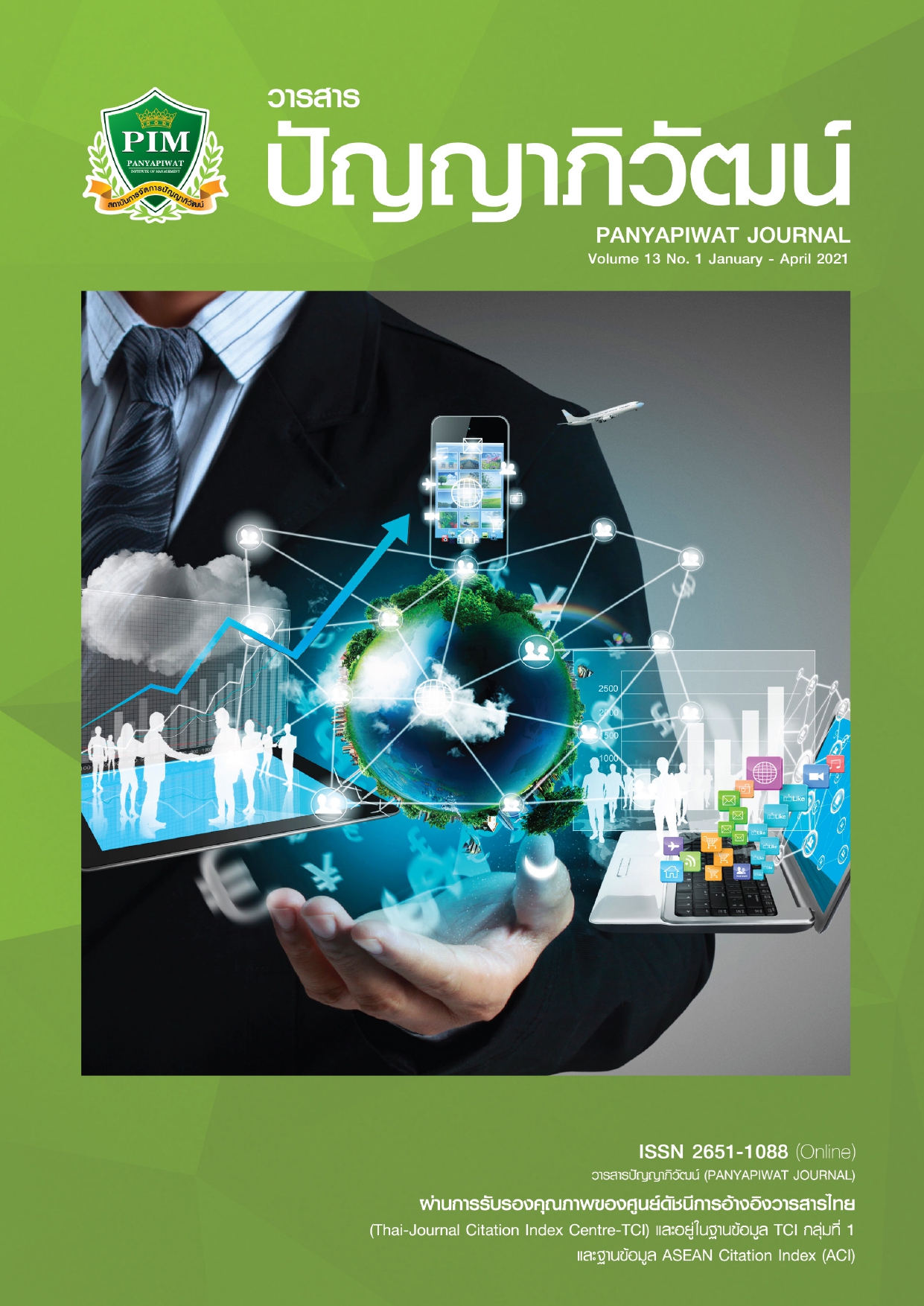ปัจจัยเชิงสาเหตุและผลของความสามารถการจัดการการเรียนรู้ของพนักงานด้านสิ่งแวดล้อมของอุตสาหกรรมอาหารแปรรูปในประเทศไทย
Main Article Content
บทคัดย่อ
บทความวิจัยนี้มีวัตถุประสงค์เพื่อศึกษาปัจจัยเชิงสาเหตุที่ส่งผลต่อความสามารถการจัดการการเรียนรู้ ของพนักงานด้านสิ่งแวดล้อม ประกอบด้วยการตระหนักถึงสิ่งแวดล้อมขององค์การ ภาวะผู้นำการเปลี่ยนแปลง ด้านสิ่งแวดล้อม รวมถึงผลที่เกิดจากความสามารถการจัดการการเรียนรู้ของพนักงานด้านสิ่งแวดล้อม ได้แก่ สินทรัพย์ทางปัญญาด้านสิ่งแวดล้อม การตอบสนองต่อผู้มีส่วนได้ส่วนเสียภายนอก และคุณค่าขององค์การ นอกจากนี้ยังศึกษาอิทธิพลของความยืดหยุ่นขององค์การที่ส่งผลต่อความสัมพันธ์ของความสามารถการจัดการ การเรียนรู้ของพนักงานและผลที่เกิดขึ้น การวิจัยครั้งนี้เป็นการวิจัยเชิงปริมาณ เครื่องมือการวิจัยคือ แบบสอบถาม เก็บข้อมูลกับผู้ประกอบกิจการอุตสาหกรรมอาหารแปรรูปในประเทศไทย จำนวน 248 ตัวอย่าง จากประชากร จำนวน 2,270 ราย ทดสอบสมมติฐานโดยการวิเคราะห์สมการโครงสร้าง และการวิเคราะห์การถดถอย ผลการ วิจัยพบว่า ปัจจัยสาเหตุที่กล่าวมามีผลกระทบเชิงบวกต่อความสามารถการจัดการการเรียนรู้ของพนักงาน ด้านสิ่งแวดล้อม ซึ่งส่งผลเชิงบวกต่อไปยังปัจจัยผล ขณะที่ความยืดหยุ่นขององค์การส่งผลเชิงบวกต่อ ความสัมพันธ์ระหว่างความสามารถการจัดการการเรียนรู้ของพนักงานด้านสิ่งแวดล้อมและการตอบสนอง ผู้มีส่วนได้ส่วนเสียภายนอก ผลจากการวิจัยครั้งนี้สามารถสร้างข้อเสนอเชิงนโยบายระดับมหภาค เพื่อกำหนด นโยบายการเสริมสร้างทุนมนุษย์และการผลิตอาหารแปรรูปที่ปลอดภัยและเป็นมิตรต่อสิ่งแวดล้อม
Article Details
“ข้าพเจ้าและผู้เขียนร่วม (ถ้ามี) ขอรับรองว่า บทความที่เสนอมานี้ยังไม่เคยได้รับการตีพิมพ์และไม่ได้อยู่ระหว่างกระบวนการพิจารณาลงตีพิมพ์ในวารสารหรือแหล่งเผยแพร่อื่นใด ข้าพเจ้าและผู้เขียนร่วมยอมรับหลักเกณฑ์การพิจารณาต้นฉบับ ทั้งยินยอมให้กองบรรณาธิการมีสิทธิ์พิจารณาและตรวจแก้ต้นฉบับได้ตามที่เห็นสมควร พร้อมนี้ขอมอบลิขสิทธิ์บทความที่ได้รับการตีพิมพ์ให้แก่สถาบันการจัดการปัญญาภิวัฒน์หากมีการฟ้องร้องเรื่องการละเมิดลิขสิทธิ์เกี่ยวกับภาพ กราฟ ข้อความส่วนใดส่วนหนึ่งและ/หรือข้อคิดเห็นที่ปรากฏในบทความข้าพเจ้าและผู้เขียนร่วมยินยอมรับผิดชอบแต่เพียงฝ่ายเดียว”
เอกสารอ้างอิง
Annachiara, L. & Raffaella, C. (2016). Human Resource and Customer Benefits through Sustainable Operations. International Journal of Operations & Production Management, 36(12), 1719-1740.
Chang, C. H. & Chen, Y. S. (2012). The Determinants of Green Intellectual Capital. Management Decision, 50(1), 74-94.
Chen, Y. S. (2011). Green Organizational Identity: Sources and Consequence. Management Decision, 49(3), 384-404.
Chen, Y. S. (2008). The Driver of Green Innovation and Green Image-Green Core Competence. Journal of Business Ethics, 81(3), 531-543.
Dai, J., Chan, H. K., & Yee, R. W. Y. (2018). Examining Moderating Effect of Organizational Culture on the Relationship between Market Pressure and Corporate Environmental Strategy. Industrial Marketing Management, 74, 227-236.
Darnall, N., Seol, I., & Sarkis, J. (2009). Perceived Stakeholder Influences and Organizations’ Use of Environmental Audits. Accounting, Organizations and Society, 34(2), 170-187.
Farooq, R. (2018). A Conceptual Model of Knowledge Sharing. International Journal of Innovation Science, 10(2), 238-260.
Grabowski, R. (2015). Agriculture, Labor Intensive Growth, and Structural Change: East Asia, Southeast Asia, and Africa. Journal of South Asian Development, 1(1), 43-64.
Hair, J. F. (2014). Multivariate Data Analysis (7th ed.). Harlow: Pearson.
Huang, C. L. & Kung, F. H. (2011). Environmental Consciousness and Intellectual Capital Management: Evidence from Taiwan’s Manufacturing Industry. Management Decision, 49(9), 1405-1425.
Inoue, Y. & Kent, A. (2012). Investigating the Role of Corporate Credibility in Corporate Social Marketing: A Case Study of Environmental Initiatives by Professional Sport Organizations. Sport Management Review, 15(3), 330-344.
Jackson, D. L. (2001). Sample Size and Number of Parameter Estimates in Maximum Likelihood Confirmatory Factor Analysis: A Monte Carlo Investigation. Structural Equation Modeling: A Multidisciplinary Journal, 8(2), 205-223.
Jackson, S. E. (2011). State-of-the-Art and Future Directions for Green Human Resource Management: Introduction to the Special Issue. German Journal of Research in Human Resource Management, 25(2), 99-116.
James, N. P. (2017). Service of Followers as a Leadership Competency: A Social Exchange perspective. Journal of Management Development, 36(3), 361-375.
Jang, Y. J., Zheng, T., & Bosselman, R. (2017). Top Managers’ Environmental Values, Leadership, and Stakeholder Engagement in Promoting Environmental Sustainability in the Restaurant Industry. International Journal of Hospitality Management, 63, 101-111.
Justin, P., Ashwin, M., & Jayesh, P. (2016). Predicting Green Product Consumption Using Theory of Planned Behavior and Reasoned Action. Journal of Retailing and Consumer Services, 29, 123-134.
Kampaengngoen, A., Boonyoo, T., & Boonthanon, S. (2019). The Structural Equation Model on the Casual Relationship of Organizational Environment and Work-Life Quality Affecting Perception of Employees Work Happiness at Kasikornbank Public Company Limited, Ratburana Head Office. Panyapiwat Journal, 11(3), 124-137. [in Thai]
Molina-Azorín, J. F. (2009). Green Management and Financial Performance: a Literature Review. Management Decision, 47(7), 1080-1100.
Kushwaha, G. S. & Sharma, N. K. (2015). Green Initiatives: A Step Towards Sustainable Development and Firm’s Performance in the Automobile Industry. Journal of Cleaner Production, 121, 116-129
Phoemphian, T. (2019). Employee Experience: People Management Tool. Panyapiwat Journal, 11(3), 306-315. [in Thai]
Renwick, D. W. S. (2016). Contemporary Developments in Green (Environmental) HRM Scholarship. The International Journal of Human Resource Management, 27(2), 114-128.
Robertson, J. L. & Barling, J. (2013). Greening Organizations Through Leaders’ Influence on Employees’ Pro-environmental Behaviors. Journal of Organizational Behavior, 34(2), 176-194.
Rubin, A. (2012). Statistics for Evidence-Based Practice and Evaluation (3rd ed.). Belmont: Cengage Learning.
Subramanian, N. (2016). Green Competence Framework: Evidence from China. The International Journal of Human Resource Management, 27(2), 151-172.
Tairu, Z. O. (2018). Green Human Resource Management—Delivering High-Performance Human Resource Systems at Divine Word University Papua New Guinea. In Filho, W. L. (Eds.), Handbook of Sustainability Science and Research (pp.489-511). Cham: Springer.
Tariq, S., Jan, F. A, & Ahmad, M. S. (2016). Green Employee Empowerment: A Systematic Literature Review on State-of-art in Green Human Resource Management. Quality & Quantity, 50(1), 237-269.
Vazquez, D. A. (2016). Stakeholders, Green Human Resource Management (GHRM) and environmental proactivity in Brazil. Academy of Management Proceedings, (1), 12686.
Watcharadamrongkun, A. & Pooripakdee, S. (2019). The Study Factor Open Innovation Affected Innovation Performance of Employees of Banphaeo General Hospital Samutsakhon: The Moderator Role of Organization Support Policy. Panyapiwat Journal, 11(2), 97-109. [in Thai]


